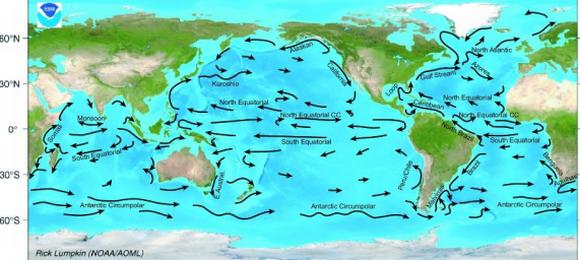 Climate change is affecting the oceans in a wide variety of ways. Oceans are warming and acidifying as temperatures rise and CO2 increases. Sea levels are rising as polar ice caps melt. Recently a study suggests that ocean currents have been accelerating, driven by rising wind speeds.
Climate change is affecting the oceans in a wide variety of ways. Oceans are warming and acidifying as temperatures rise and CO2 increases. Sea levels are rising as polar ice caps melt. Recently a study suggests that ocean currents have been accelerating, driven by rising wind speeds.
Scientific American reports that a study published…in Science Advances finds that global ocean circulation has been accelerating since the 1990s. The study examined decades of observations from instruments that monitor the seas’ kinetic energy—a measurement of how fast the water is moving.
A closer look, region by region, suggests that much of the acceleration is happening in the tropics. And circulation also appears to be speeding up in other swaths of the Atlantic, Indian and Pacific oceans.
There are still some parts of the ocean that either aren’t speeding up or are actually slowing down, the study notes. But on the whole, as a global average, the waters are moving faster and faster. The reason is accelerating winds.
Multiple studies have suggested recently that winds over the oceans are speeding up. And because winds are some of the primary forces that drive ocean circulation, they’re also causing the seas to move faster.
…Models suggest that continued global warming may have a growing effect in the future. More climate change may mean a greater strengthening of ocean winds, and potentially even faster ocean circulation. Faster circulation could change the way heat and nutrients are transported around the world and could potentially alter global weather patterns and affect marine ecosystems.
Not all currents are accelerating, however. The Atlantic Meridional Overturning Circulation, or AMOC, of which the Gulf Stream is a part appears to be slowing down, according to recent studies. A 2015 study suggests that the AMOC has weakened by 15-20% in 200 years.
…Many scientists believe that climate change is playing a strong role. They suggest that cold, fresh meltwater from the Greenland ice sheet is disrupting the current’s flow and causing it to slow down. Modeling studies suggest this effect may worsen in the future if the ice sheet melts at faster rates.
Thanks to Dexter Donham for contributing to this post.
